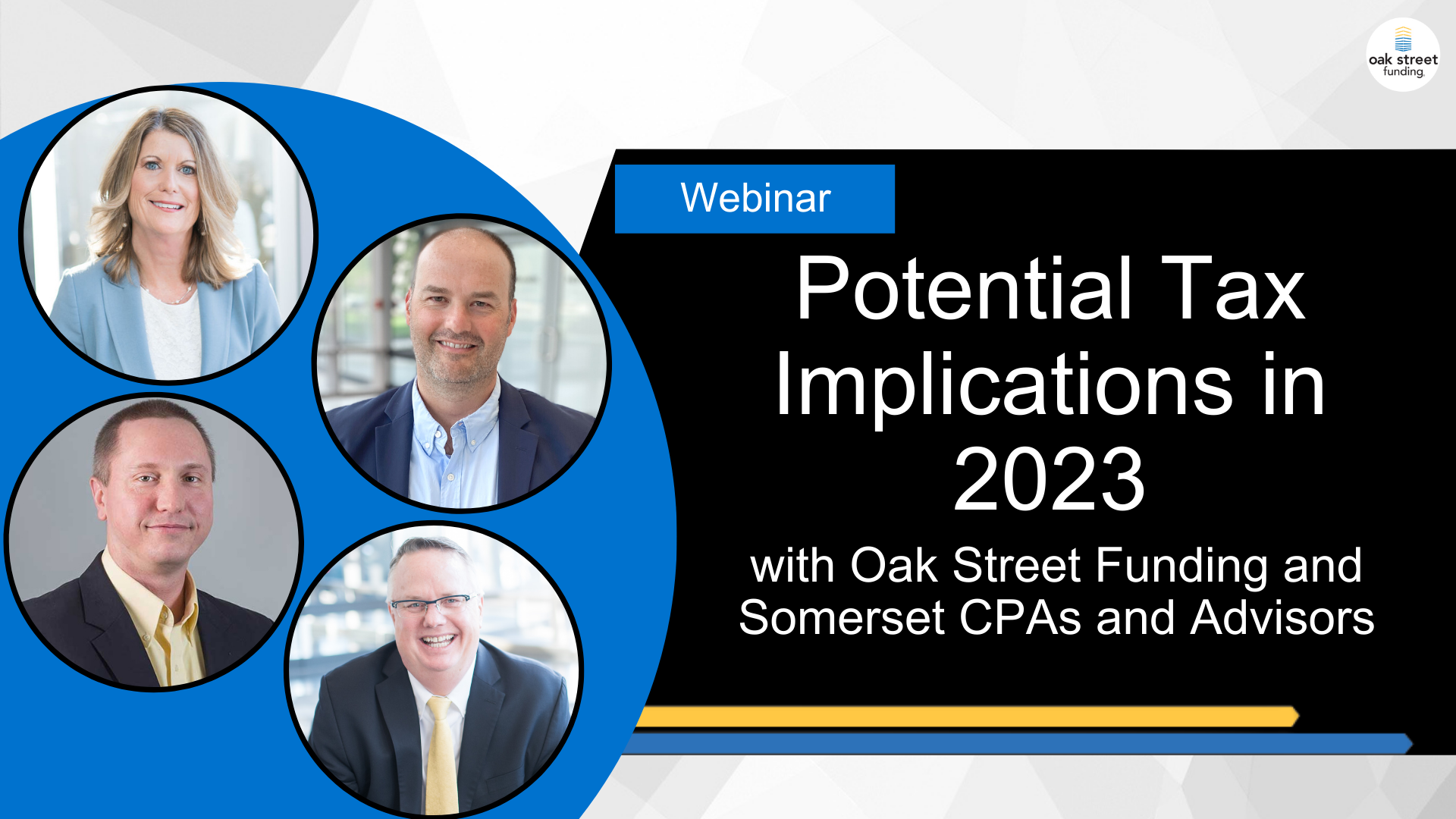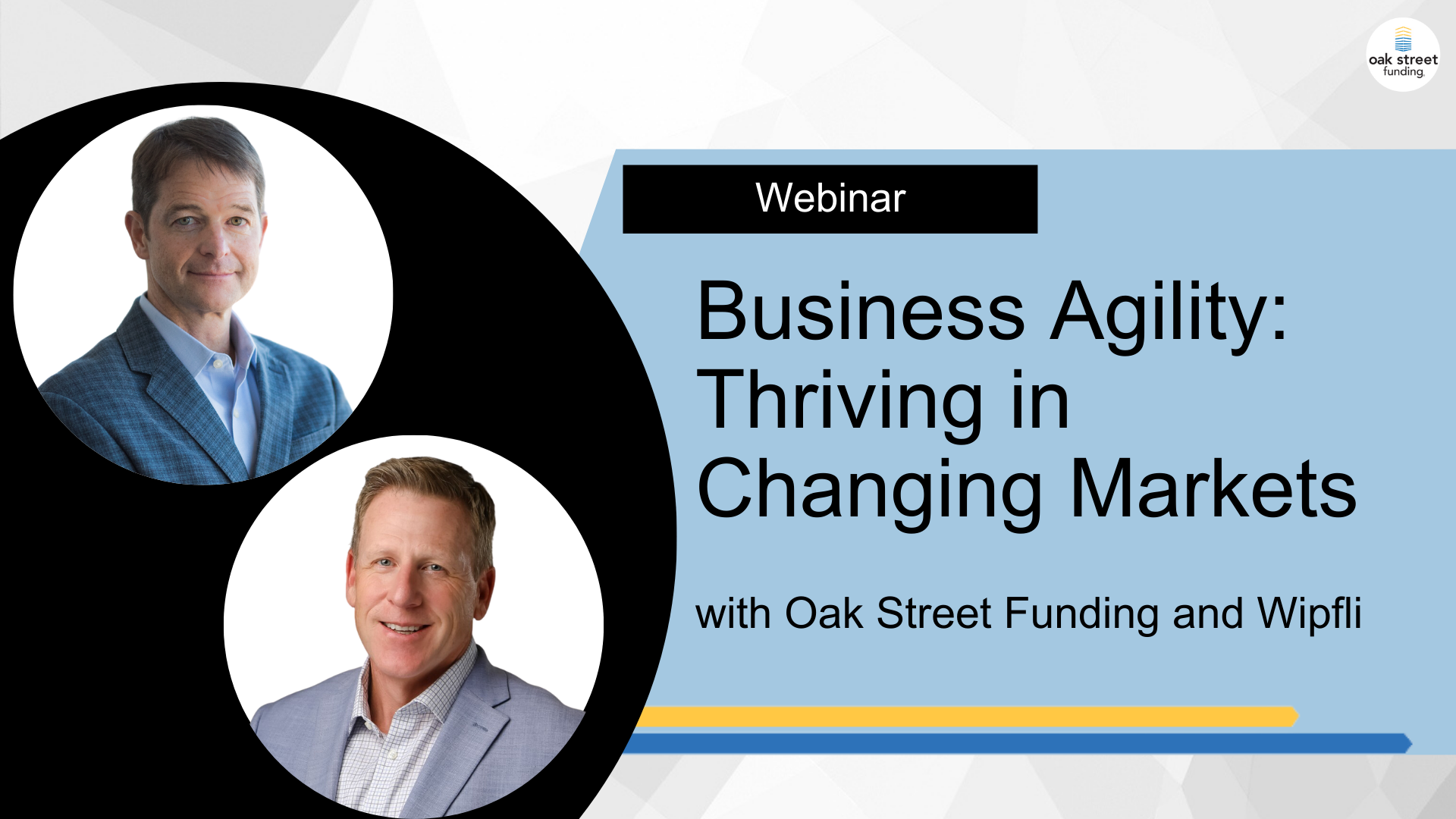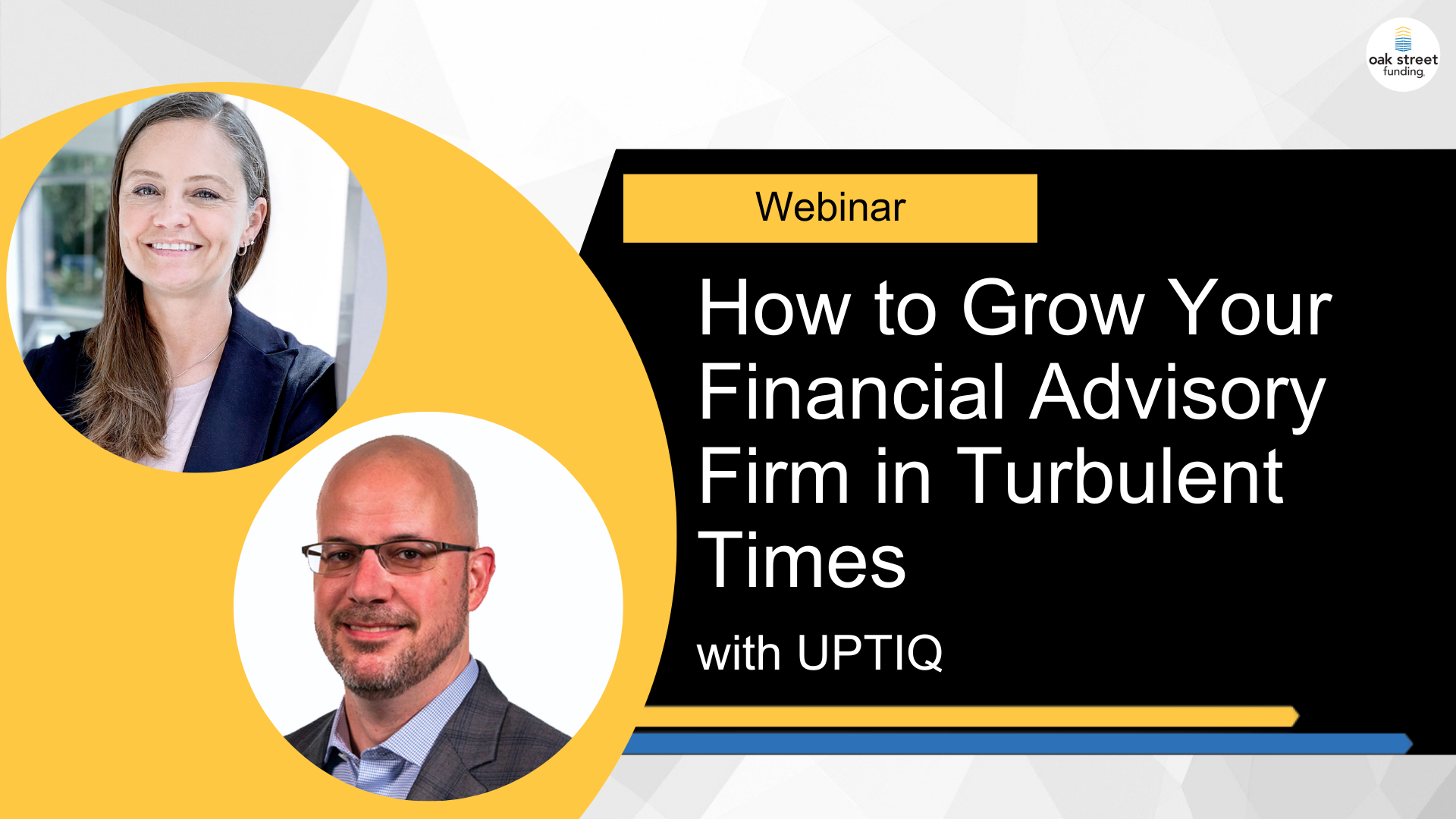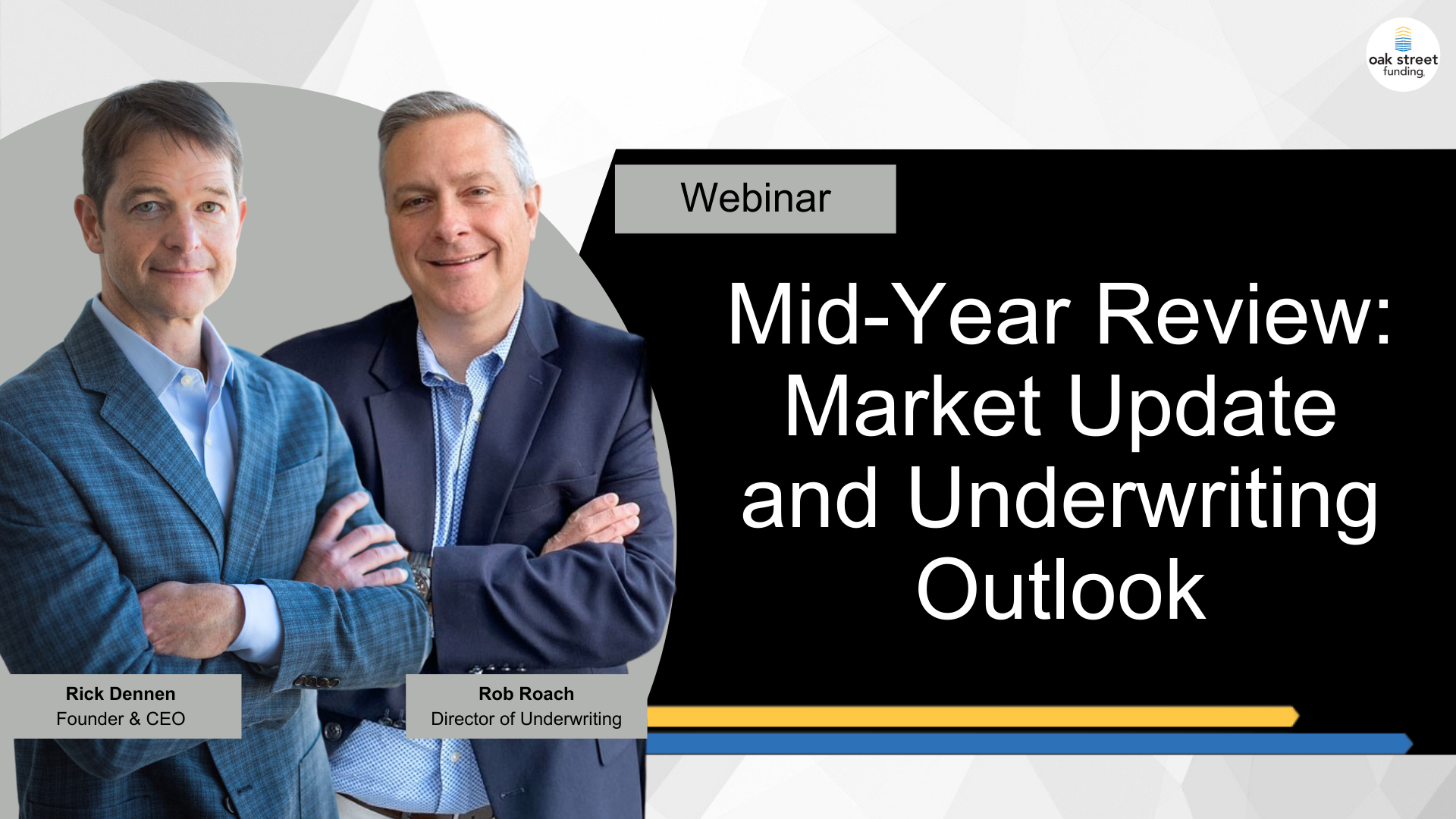Potential Tax Implications in 2023 - With Somerset CPAs and Advisors
- 0.5
- 1
- 1.25
- 1.5
- 1.75
- 2
Bridget Haight: Hi everyone, and thank you for joining us today for our first webinar in 2023. I am Bridget Haight and I'm host and moderator for Oak Street Funding Webinars and Podcasts. Today I'm happy to be joined by Steve Blake and Susie McEuen and Bruce Warren and Kyle Castle. Steve is a principal with Somerset's Dealership team where he focuses his time on mergers and acquisitions, tax strategic planning and tax compliance. Today we will discuss 2023 tax changes and implications and the potential impacts it could have on the market, our borrowers and business owners. So thank you for joining us today.
Steve Blake: Yeah, thank you, Bridget. Thanks for the introduction. I appreciate the opportunity to be here and hopefully share some useful information for your clients.
Bridget Haight: Yes, we've loved having you in the past, so thanks for joining us again.
Steve Blake: Thank you.
Bridget Haight: So we always receive a few questions at the beginning of the year about tax changes. So can you take us through the many changes that might be happening now or in the near future?
Steve Blake: Yeah, so 2022 and 23 are kind of interesting years. Back when Trump was president, they had the Tax Cuts and Jobs Act that came out in December of 2017. That's where you had the reduction in the tax brackets, the increases in the standard deduction. There were a lot of tax benefits that came in as part of that package. But unfortunately, one of the Senate rules requires that over a certain period of years, tax packages have to be revenue neutral. So one of the things that happened is all those great benefits that we see start to kind of sunset. So they start to go away. Well, starting in 2022, a lot of those provisions start to go away through '23, '24, and '25, they all go away. So we've got a lot of changes coming just as a result of the benefits of the Tax Cuts and Jobs Act going away. But then you've also got a lot of new bills that have come into play. So we've got, for example, the Inflation Reduction Act that President Biden signed earlier this year. A lot of those provisions then start in 2023. Now, a lot of those provisions, as far as the things that are not beneficial, are going to impact large corporations. Unfortunately, what that means is increased cost for the rest of us because it's going to impact companies that are all the auto manufacturers, the Amazons of the world, Walmarts, those are all the big mega corporations in the United States that we all purchase products from. As a result of their taxes going up, they're obviously going to pass that along to us, the consumer. So unfortunately, you've got a kind of combination here over the next couple of years of tax benefits going away and product costs rising.
Bridget Haight: Okay. That's exciting. So this leads me to ask a follow- up question to understand the lending outlook. So not only are there constant eyes on the market, the new year tax changes and the follow- up from the December interest rate hikes, but there are fears of a recession because of all of this as well. So Susie, Bruce, Kyle, there is so much going on, what is your borrowing outlook for the first quarter of the year and going forward, what is the activity level like? Susie, I'll start with you.
Susie McEuen: Thank you, Bridget. We are a conventional lender and we have the capacity to lend up to $50 million. And I think with the recent rate hike that we just saw, it will probably not hit us as a lender until maybe after first quarter because we are already in a position right now that we have a really excellent pipeline. We have borrowers that have come to us that weren't able to get financing before the end of the year, and it's all rolled over into the first quarter. Now, we'll say this is that a lot of the opportunities that we're looking at are related to succession planning. It seems as though M&A is down a little bit, but I think that we're going to see still the stronger firms are going to still come towards working with us. They're going to need financing, even with the rates going up. And we have to remember too, the rates that we're seeing now, they're not horribly higher. I mean, it's still affordable to be able to lend and we're open for business.
Bridget Haight: Great. This is good news. So Bruce, do you have anything to add to that?
Bruce Warren: I focus a lot on the accounting industry for M&A work. So most of the deals take place in the fourth quarter, in the first month of the following year anyway. So the velocity of transactions right now is typical. I don't see any really slowdown. In the accounting industry, there's three to 4,000 transactions per year, whether it's an internal succession or an actual acquisition. And the guys who are serious, they understand that interest rates are the cost of doing business. So they factor that into how they structure deals. And as a capital provider, I don't see any slowdown.
Bridget Haight: So you don't see much change. Okay.
Bruce Warren: It's going to be a problem going forward if there's a recession. People get scared, but for the most part, I think business owners are still going to be buying and selling to each other.
Bridget Haight: Kyle, what do you think
Kyle Castle: As the tax increases and cost increases affect the insurance industry, it affects the individuals and companies that are on the fringes. We've got the companies that have the lower revenue. It will have greater effect on those companies, but individuals and companies that have higher revenue and higher income, it has not as much as effect on them because our biggest area of focus is cashflow. And as their cost increases and as their tax burden increases, it will negatively affect their net operating income, which has a potential to affect their borrowing ability. But these incremental increases in taxes and incremental increases in interest rates don't have a vast overall effect on businesses because they're smart individuals. They're building it into their underlying cost of doing business as well as they're planning for it. These are well broadcasts, tax increases and interest rate increases there. There's nothing secret about it. And so it doesn't have as big effect as one might think, especially in the short term.
Bridget Haight: Great. Thanks, Kyle. So my next question is, how are Federal Reserve increases influencing the makeup of deals in each industry?
Susie McEuen: In the RIA industry, I would say that when it comes to M&A, mergers and acquisition and also succession, I think some of these buyers and sellers, whether it's like a shareholder buyout, they may look at opportunities to do internal type financing because rates could be a little bit lower. But again, even though prime is now at seven and a half, Oak Street Funding, our index we use currently is tied to US Treasury rates. And so I think borrowers are looking at, " Okay, do I go variable? Do I go fixed?" We offer both. So they have an option. But I think the structure of the deal as well as when it comes to acquisition loans, when there's a buyer and a seller note, us being the bank, maybe the inaudible may be higher. There's a lot of creative ways of structuring these deals. And the one thing about working with Oak Street Funding, we are a conventional lender, not SBA, and we can be a little bit more creative. So I think it's just going to take a little bit more creativity, and I think people are going to be a little bit more cautious as far as how much they're going to be borrowing. And obviously, cash flow is king. That's what it's going to take to repay the debt.
Bridget Haight: Sure. Anybody else have something to add to that?
Bruce Warren: I don't think I see Federal Reserve rate increases really affecting deal structure. I think that comes down to how the buyer and seller feel about the transaction. What I see now is the buyers putting more onus back on the sellers for transition risk. So they want to put less down up front versus the seller carrying paper. For our standpoint, from the lender side, our structure is our structure so that that's easy. We don't change that for taxes.
Bridget Haight: Okay. Great. Thank you. And Steve, back to you. How do tax changes interact with those interest rates related to fiscal and monetary policy? And how should businesses best prepare or react?
Steve Blake: So I'd say a couple of things in terms of how those interest rates impact you from a tax perspective, but then also from a financial statement perspective. So on the tax side, the easiest impact to see is we've got a lot of clients that like to pay their taxes late because interest rates from the IRS for the interest and penalties are really low. You can earn more on those funds, investing those funds, using those funds within the business and pay your taxes late and just pay the penalties and interest. But historically, the last several years, those interest rates for the IRS have been hovering around 3%. They've announced for the first quarter of 2023, that's going to jump up to 7%. So over the course of this year, their penalties on interest have more than doubled. So it's one of those situations where if you're somebody who likes to use those funds to get a return on investment and then just pay the penalties and interest, you might want to take a harder look at that now with the higher interest rates for the penalties and interest with the IRS. The other aspect of it is from a financial statement reporting, and this will impact you guys more from a lending perspective, there are changes coming into what's called GAP, the generally accepted accounting principles and how those financial statements are presented. One of the biggest ones being the new lease standard that came into effect and how that has to be reported on your financial statements. So it has an impact on both an asset and a liability. So if you've got loan covenants related to various ratios based on your balance sheet, that could have a major impact on whether or not you meet those covenants or not, which could cause you to have to pay higher interest rates if you're not meeting those covenants. So it's something you'll want to look at with your lenders and talk about how those changes in gap. Because there's nothing change from the business perspective, it's just how those items are reported on your financial statements. So there's no real change in real world circumstances. So you got to have a conversation with those lenders about how are we going to either adjust those covenants and how they're calculated or get waivers for those covenants as a result of these changes in the gap reporting standards.
Bridget Haight: Okay. Great. So then as a lender looking at the value of someone's business to offer them capital, how does what Steve said impact decisions that advisors, agent, accountants who are business owners should be making?
Susie McEuen: Yeah, I think it's going to be really important. I appreciate the comments that you made because I think it's really important that our clients surround themselves with professionals like you to help make sure that they have all their financials in order. When they're borrowing money in excess of a million dollars, obviously that creates some covenant opportunities and we're going to have to take a really close look at that. And so the key is, is that the cash flow is going to be available to cover the debt service. If they're borrowing money for succession, whether it's expansion or M&A, we're going to have to make sure that they are working with a professional like yourself, Steve, that is going to have the capacity to be able to cover the debt service, coverage ratios or was it funded debt to EBITDA. But with the volatility in the market and assets under management, because I'm in the RIA sector, that is going to affect overall cash flow, the profitability. And so that affects EBITDA. And EBITDA is looked at as far as the valuation for the company. And so that could impact how much we're going to available to lend as well.
Kyle Castle: Actually, I have a follow-up question for Steve. So with the changes in GAAP and the reporter requirements for lease payments to be both as a asset or show up on their asset balance sheet as well as liability, how does that affect their balance sheet overall, and how does that affect their profitability looking at their profit and loss statement?
Steve Blake: So from a profit law statement perspective, you're not going to see much of any of a change. All this is doing is requiring that whatever leases they have, and some clients have hundreds of leases, depending upon the type of business. Those have to be put up on as an asset, but it's more of a long- term asset. And then on the liability side, there's going to be a difference between what's being put up as a long term asset, what's being put on as a liability in total on that together. But the liability gets broken down between long term and short term. So if you've got ratios such as the current ratio that's looking at current assets versus current liability, you've now added a current liability but no current asset. So overall, across the whole balance sheet, it's going to be a net zero. But when you're looking at some of these ratios that are calculated on current versus long term, you're definitely going to see an impact.
Bridget Haight: Okay, great. Thank you. So we've discussed what owners should be doing to look good for a lender while being tax efficient. Let's take a step back and ask how owners can set themselves up for M&A. First, are there tax considerations on M&A and restructuring on the buyer's side?
Steve Blake: Yeah. So definitely on the buyer side, you always want to look at buying assets, not actually buying the company. And the reason for that from a tax perspective is you get the depreciation and amortization of those assets that you're purchasing versus if you're just to buy the stock or ownership of a company that's going to go up on your balance sheet as an investment in that company. But there's no tax benefit to that, there's no deductions related to it. And typically, when you're trying to structure the deal, you want to put as much of the purchase price as you can towards the hard assets versus goodwill. Goodwill is amortized for tax purposes over 15 years. So you do eventually get those tax deductions, but it could take you up to 15 years to get them versus on those hard assets, a lot of those, you can take the full deduction in the year of the purchase.
Bridget Haight: So as someone out talking to potential M&A buyers and sellers each day, what are you seeing in terms of M&A activity in the advisor, accounting, insurance industry? Are you seeing any new successful strategies?
Steve Blake: A lot of what I'm seeing, and of course, you guys please jump in and say what you're seeing as well. I'd love to hear your side of this. But what I'm seeing, you mentioned this a while ago, Bruce, is that kind of the structuring of the deal. A lot of the industry that I work with have had really good years the last couple of years. So sellers are wanting to sell at a really high purchase price based on the great results they've had in the last couple of years. Buyers are more pessimistic, I guess you would say about what the future holds for those businesses, especially as we've seen here in the fourth quarter, some pretty big slowdowns. So those buyers are looking more for longer term, larger earnouts, wanting that seller to kind of bet on themselves and on the business. If the seller really thinks it's worth that, well put your money where your mouth is and let's have an earnout over 18 months, three years, five years, and let's see if those results really come to fruition rather than just a seller trying to convince you of that. So the buyers are kind of hedging a little bit on their purchase price and structuring so that it is based on actual results over a period of years rather than what could happen down the road.
Susie McEuen: It's going to be a tug of war. Yeah, the seller's going to want more. And because we have been living, I call it like fat cats, this has been the best few years. We haven't experienced anything like this. And so I think with that, there's going to be hopefully the right buyers and sellers together because it's definitely a marriage and they got to be on the same page. And I think I've seen a situation recently in the RIA space where the seller, being the founder is selling to next gen. They've already locked in a price at this point because the gen two wants to make sure that they're going to be able to afford it. So they are being a little creative among themselves, and I think we're going to see more of that.
Bridget Haight: Okay. Great. Bruce, Kyle, anything to add to that?
Bruce Warren: So in the accounting industry, I think there's always been a pretty well defined revenue multiple as far as what these practices sell for. But what's changing right now is private equity money's coming into the industry and they're starting to teach these accounting firms that they have to show profit on the bottom line so they can trade at higher multiples of EBITDA, which is a real big change for the accounting industry. And the new successful models are roll up strategies to help these individual owners, like for succession plan, help them exit. And Steve said, the three to five year earnouts, put your money where your mouth is, it's becoming standard operating for accounting sales at this point.
Bridget Haight: Okay. Okay. Kyle, anything else?
Kyle Castle: Yeah, so as we see the cost of borrowing funds increase and we see the cost of overall running business and increase in tax liabilities, it becomes a little bit more difficult for individuals to do mergers and acquisitions. However, because you work with a lender like Oak Street and we can help you structure the deal, we're going to push you to get a larger owner seller note, we're going to push you to put a little bit more cash down because we want to spread the risk because we want to spread the risk over you're putting cash down, the seller's going to be carrying a seller note and the lender's going to be providing a large portion of the acquisition costs. And as the cost increase and as your profitability decreases and the profitability of the seller's business decreases, but you're still... Often, there's still buyers asking premium pricing for their insurance agency. And eventually, there's going to have to be a general market correction. But overall, again, and these changes are incremental. These things are happening very publicly, very open. And so it doesn't affect the overall business in the marketplace. It's just, these are very incremental changes that we've all been expecting.
Bridget Haight: Okay. Great. Thanks for that, Kyle. So I do want to ask all of you one last question. So it's January and businesses have the whole year ahead of them. And for the most part, what are the things that they can do now to help them maximize their success in 2023? Steve, I'll start with you.
Steve Blake: Sure. So as I talked about earlier, there are a lot of changes coming over the next few years. So what we've been working with our clients on are multi- year projections. Typically, in the tax world, things kind of stay the same from one year and the next over a long period of time. So you're kind of looking at maybe this year and the following year. But what we're doing with a lot of our clients is doing more of a five to 10 year lookout with all these changes that are coming to try and see how that's going to impact them from a cash flow perspective because there are a significant number of changes over the next several years. And then as part of that, trying to put together a five to 10- year strategic plan and how are we going to accomplish goals? What are the things that are going to be put in place to overcome some of these hurdles that are coming towards us in the next few years?
Susie McEuen: Yeah. I appreciate you saying that, Steve, because our borrowers, when they come in, whether if it is succession, M&A, expansion, whatever the case is, we do ask for projections for three years. And some of these borrowers that are less sophisticated, maybe smaller independent advisors, RIAs, they're not used to doing that. So we do encouraging them to work with their CPA, their accountant, to help them map out what they're going to look like because when they borrow money from us, their situation is dramatically changing from the cash flow they're going to need to repay the debt. And so they need to be prepared. And then also the fact that you mentioned about the changes with how the IRS is going to charge, we do have a lot of borrowers that take advantage of that and file taxes late. And they also pay the penalty or they're on tax plans. The one thing that we really try to strive is make sure that our borrowers are current with their tax situation. And we're probably going to look at that a little bit more harder than ever before, just because of the nature of the situation with taxes may be being higher, cash flow being less, and the volatility in the market with assets under management. We just want to make sure that they can meet all the obligations.
Bridget Haight: Great. Thanks, Susie. Kyle, do you have anything about how to maximize success for businesses?
Kyle Castle: Yeah, for the outlook for 2023, the biggest key, if you are a small business owner and you're considering purchasing a book of business or acquiring a competitor, or if you're even considering selling your insurance agency, the biggest key to success is having profitability and having a clean financial statement. Because as lenders and as a potential buyer evaluating your agency or a potential acquirer of another insurance agency, being able to present clean financials, showing profit, keeping expenses in line with your revenue, those are going to be key steps to maximizing either your purchase price or whether your sales value, or whether your acquisition strategy. Having clean financials, even if you are the acquirer, the buyer, you need to have clean financials and show profitability on your financial statements so that you can show that you can qualify to service the debt of the target you're trying to acquire. So having clean financials, showing profitability, and being able to produce those documents in a timely fashion, those are going to be key for any acquiring strategy in 2023.
Bridget Haight: Great. Thanks, Kyle. And Bruce, last but not least, final thoughts.
Bruce Warren: ... Firm or clients going to be going on a strategic acquisition tear, I think the best thing to do is get in touch with all your trusted advisors, your accountants, which is easy for me because I deal a lot with accountants, they're their own trusted advisors. Law firms, just to make sure your partnership agreements are intact, everything is above board, and the financial statements, of course, just from pro forma standpoint. And then you get with your capital provider and make sure that you understand what they're going to be looking for as far as structure and requirements financially. I think it's got to be looked at as a team effort. If you're going to be going on that kind of strategy, it's crucial to get with a capital provider.
Bridget Haight: All right. Thank you everybody for your answers. Thanks for joining us. It was great. So I hope you all learned something today. We will send out more resources related to this topic throughout the upcoming week. So keep your eyes in ears open for more on Oak Street Funding and Somerset CPAs and Advisors. Thanks for tuning in and have a great day and a fantastic new year.
DESCRIPTION
The upcoming 2023 tax changes will potentially have many implications for your business. Moderator Bridget Haight and Oak Street Funding's lending specialists, will be joined by Steve Blake of Somerset CPAs and Advisors, P.C. as they highlight the new tax policies and discuss their impacts.
Today's Guests

Susie McEuen

Bruce Warren

Kyle Castle








